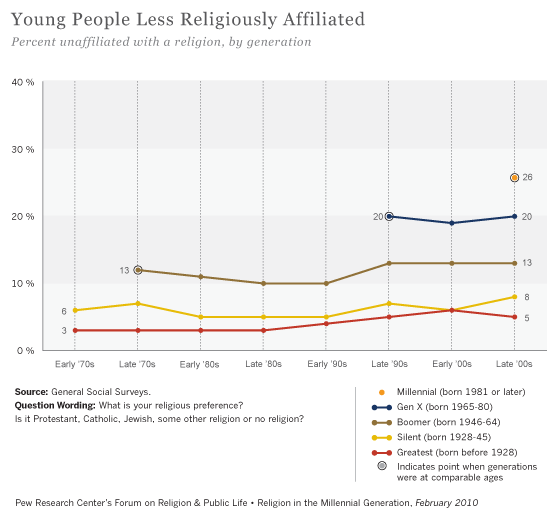A 2010 Pew Research report Religion Among the Millennials (born 1981-2000) says that 26% of millennials are unaffiliated with a religion; Double the rate for boomers.
Yet in other ways, Millennials remain fairly traditional in their religious beliefs and practices. Pew Research Center surveys show, for instance, that young adults’ beliefs about life after death and the existence of heaven, hell and miracles closely resemble the beliefs of older people today. Though young adults pray less often than their elders do today, the number of young adults who say they pray every day rivals the portion of young people who said the same in prior decades. And though belief in God is lower among young adults than among older adults, Millennials say they believe in God with absolute certainty at rates similar to those seen among Gen Xers a decade ago. This suggests that some of the religious differences between younger and older Americans today are not entirely generational but result in part from people’s tendency to place greater emphasis on religion as they age.
In total, nearly one-in-five adults under age 30 (18%) say they were raised in a religion but are now unaffiliated with any particular faith.
More than one-third of religiously affiliated Millennials (37%) say they are a “strong” member of their faith, the same as the 37% of Gen Xers who said this at a similar age and not significantly different than among Baby Boomers when they were young (31%).
However boomers with strong affiliations has increased to 43% over the last 30 years.
The number who attend services at least weekly or nearly every week in 2010: Generation Born Age 2010 Attendance Millenials 1981-2000 18-29 18-27% Gen X 1965-1990 30-45 27% Boomer 1946-1964 46-64 32% Silent 1928-1945 65-82 44% Greatest before 1928 83+ 56%Note these numbers vary depending on which report you look at.

"A couple of decades ago, when young adults began showing their dissatisfaction with organized religion by voting with their feet, it was fashionable for pundits to say this was happening because those religions weren't conservative or demanding enough.
Because the exodus was initially most pronounced among liberal, mainline Protestants like Episcopalians and Presbyterians, it was easy to point at liberalism as the root of the problem."
But, strict denominations are also loosing members, many younger people.
The "political alienation" theory, which says that churches that have waged war against LGBT rights or supported Donald Trump are reaping the fallout: Millennials want nothing to do with them.
People who vote or lean Democratic are more likely to be "nones," defined as people who have no religious affiliation.
But, If the political alienation theory fully explained what's going on in American religion, millennials would be leaving conservative religions in favor of ones that are liberal and LGBT-affirming. That's not the case.
The article speculates "It is delayed marriage and more single adults".
Some nonbelievers might have stayed in organized religion in previous generations just because it was socially expected, and there were consequences for not joining the religious crowd.
There are more nones now so it is more acceptable to be a none.
Third study of the state of American theology, examining 34 beliefs, released by Ligonier Ministries and LifeWay Research. (2018), says.
(Ligonier is an international Christian discipleship organization founded by R. C. Sproul
Sproul is a minister in the conservative Presbyterian Church in America.)
"The number of Americans ages 18 to 34 with evangelical beliefs (as defined by LifeWay Research) "rose significantly" from 14 percent in 2016 to 18 percent in 2018. Ligonier also noted a "large increase" in millennials affirming that salvation is found in Christ alone (62%, up from 53% in 2016) and that Jesus Christ will return to judge the world (64%, up from 55% in 2016).
In contrast, more than half of millennials (53%) now agree that the Bible "contains helpful accounts of ancient myths but is not literally true," continuing a trend up from 46 percent in 2016 and 44 percent in 2014.
More millennials are also now viewing God as "unconcerned with my day-to-day decisions": 36 percent agreed in 2018, up from 30 percent in 2016 and 21 percent in 2014.
Ligonier's survey found that millennials have grown a bit more conservative on abortion as a sin (57% agreed in 2018 vs. 50% in 2016) and on sex outside of marriage as a sin (54% agreed in 2018 vs. 47% in 2016). However, about half believe that the Bible's condemnation of homosexual behavior is outdated (51%) and that gender identity is a choice (46%)."
Links:
Why millennials are really leaving religion (it's not just politics, folks) - Religion News Service